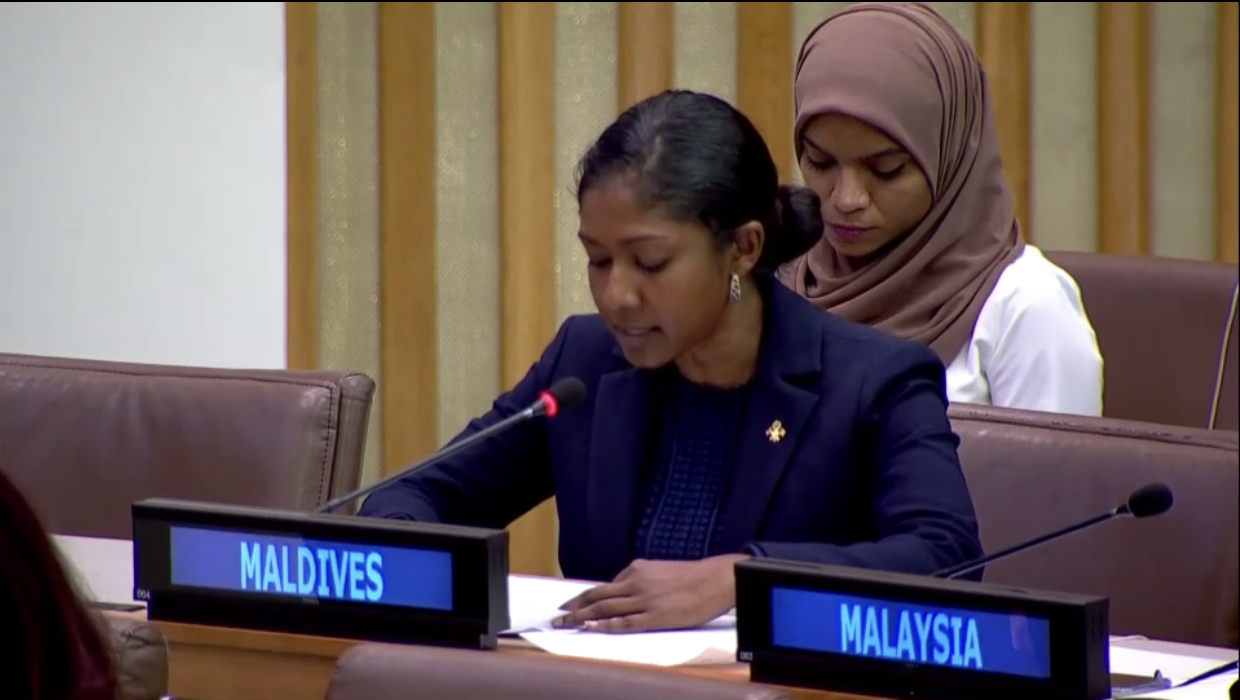Statement by Her Excellency Ms. Thilmeeza Hussain
Permanent Representative of Maldives to the United Nations
Third Committee
Statement on Social Development
1 October 2019, New York
Thank you, Mr. Chairman,
I would like to congratulate you on your election as the Chair of the Third Committee. The Maldives looks forward to working closely with you and your bureau, and I assure you of my delegation’s full cooperation in the execution of your duties. Let me also take this opportunity to thank the Secretary-General for his reports under this agenda item.
Mr. Chairman,
A year ago, the people of the Maldives voted for change. They voted for justice, equality, for basic human rights, and greater accountability. The new President of Maldives, His Excellency Ibrahim Mohamed Solih, who took the Oath of Office in November last year, pledged that all citizens will be treated with dignity and respect, regardless of their economic or social standing, nor will there be any discrimination based on their gender, age, disability or place of origin.
The new government gives high consideration to integrate actions to combat climate change into social development programming as this is vital to ensure we do not regress on gains made on social development. Stressing the significance of social development, the mandate of the Ministry of Gender, Family and Social Services was broadened to emphasize the importance of access to universal healthcare for all citizens, especially women and children, and the most vulnerable groups in our society. Furthermore, the GA resolution 72/142 on promoting social integration through social inclusion, highlights the importance of gender perspective in social inclusion strategies and initiatives. At the national level we have fully embraced this approach and the Government now pursues gender mainstreaming in policy planning and programme budgeting.
Mr. Chairman,
Social equity cannot be achieved without providing quality health services. Over the years, the Maldives has strived to improve public health services which has significantly increased life expectancy at birth. The Maldives has also eliminated diseases such as polio, malaria, lymphatic filariasis and measles. The World Health Organization certified the elimination of mother-to-child transmission of HIV and congenital syphilis. As a result of effective interventions at the primary health care level, the Maldives has seen a drastic reduction in communicable diseases. However, this has been accompanied by the rise of non-communicable diseases related mainly to changing lifestyles. Consequently, providing quality and effective treatment services for NCDs is a priority.
The Government places a great importance on the provision of education, which is essential to attain the skills and capabilities required to fully participate in and contribute to the country’s economic and social development. Inclusive education policies which start from primary school age and equal opportunities for girls and boys, have resulted in over 98 percent school enrolment. The Maldives remains committed to ensure inclusive, equitable and quality education for all, in line with SDG 4. The government also places increasing emphasis on higher education and vocational development.
Recognizing the importance of the country’s youth, the government has also expanded the role of the Youth Ministry to include community empowerment in addition to sports and recreational programmes. The Maldives is working closely with the World Bank and other partners to provide market-relevant skills and increase employment opportunities for the youth.
Mr. Chairman,
The government attaches great importance to the protection and support of the elderly and people with special needs and disabilities. Social protection schemes established by the National Social Protection Agency are aimed at promoting inclusion and providing the elderly and persons with disabilities with the same rights and opportunities as any other citizen.
The Maldives has established a number of independent institutions to promote and protect the rights of its citizens. In addition, the reform of the judicial system is currently underway with the aim of strengthening the rule of law and judicial impartiality. The Parliament is continuing its work at a fast pace to provide the legal avenues to ensure the independence of these institutions. In order to ensure inclusive and progressive social development, the Government of Maldives is committed to undertaking all the necessary reforms needed to strengthen institutions to promote good governance, human rights, and the rule of law.
I thank you Mr. Chairman.
ENDS




